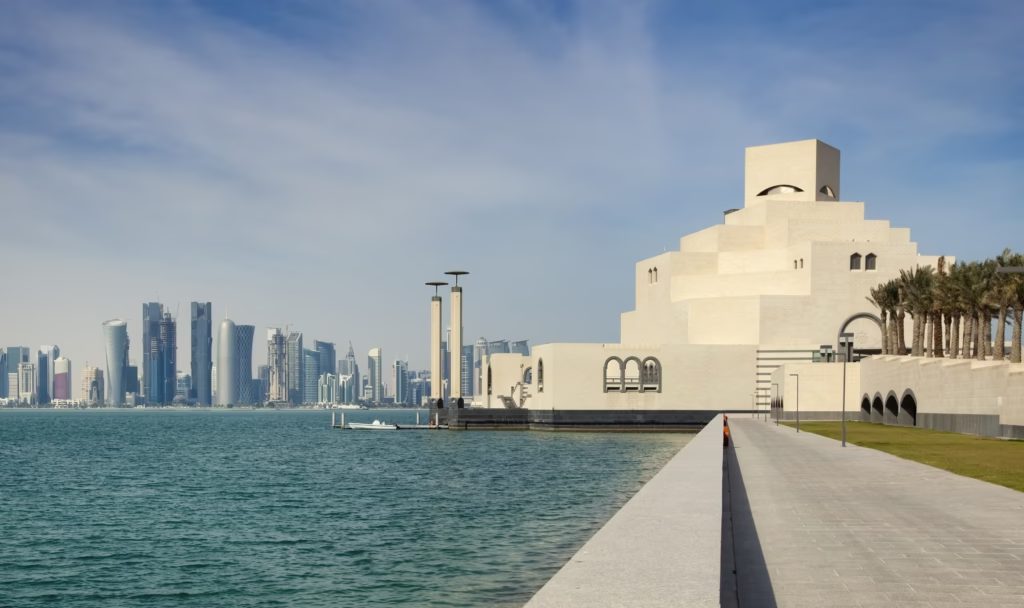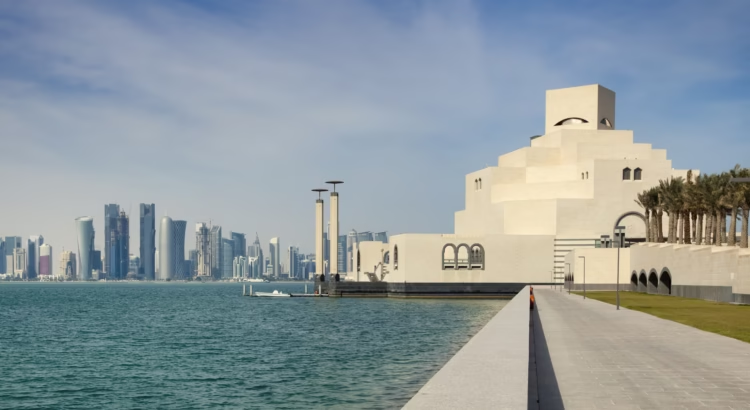
Doha, the capital city of Qatar, is a stunning tapestry woven with threads of tradition, innovation, and cultural pride. As one of the fastest-growing cities in the Gulf region, Doha represents the unique interplay between ancient desert heritage and ambitious modern development. For travelers, the city offers a multidimensional experience — from dazzling skyscrapers that pierce the skyline to vibrant souks echoing with centuries-old traditions, and world-class museums that document the nation’s past and shape its future.
This 1500-word exploration will guide you through the defining facets of Doha: its towering modernity, the rich soul of its marketplaces, and the intellectual and artistic pulse that beats within its museums.
A Skyline of Ambition: Skyscrapers in Doha
As you enter Doha, one of the most striking impressions is the city’s futuristic skyline. Towering skyscrapers line the West Bay area and the newly developed Lusail City, showcasing Doha’s economic growth and architectural ambition.
West Bay: The Heart of Modern Doha
West Bay is the financial and commercial hub of Doha. Here, gleaming glass towers house international businesses, luxury hotels, and high-end residences. Each building seems to compete in architectural creativity: the twisted form of the Tornado Tower, the golden lattice of the Al Bidda Tower, and the shimmering blue glass of the Palm Tower reflect Qatar’s vision for the future.
At night, West Bay transforms into a light show — towers lit in blues, reds, and purples, dancing against the dark sky, creating an almost surreal cityscape. From a distance, especially across the Corniche, the view of the skyline mirrored in the Persian Gulf is simply breathtaking.
Lusail City: Tomorrow’s Urban Vision
Just north of central Doha lies Lusail City, an ambitious planned metropolis that combines sustainability, innovation, and modern luxury. Lusail is home to the Lusail Iconic Stadium, a centerpiece of the 2022 FIFA World Cup, and numerous state-of-the-art developments.
With smart infrastructure, futuristic towers, and sea-facing promenades, Lusail is a vision of what urban life could look like decades from now — yet it’s already becoming a reality.
Souks of the Soul: Traditional Markets in Doha
While the skyline represents Doha’s future, the souks offer an intimate look into its cultural and historical roots. These traditional marketplaces are not just shopping venues; they are social hubs, architectural landmarks, and repositories of Qatari customs.
Souq Waqif: The Beating Heart of Old Doha
Souq Waqif is Doha’s most famous traditional market, and for good reason. Built on an ancient trading site and restored to preserve its original Qatari architecture, Souq Waqif is a labyrinth of alleyways lined with shops, art galleries, spice stalls, shisha lounges, and restaurants.
Wander through the alleyways and you’ll encounter everything from handwoven fabrics and antique jewelry to falcons and musical instruments. The scent of spices — cardamom, cumin, saffron — mixes with the smoky aroma of grilled meats and the sweet perfume of oud.
In the evening, the souq comes alive with music, street performances, and families enjoying meals in open-air courtyards. There’s an electric energy here — yet it’s grounded in timeless rhythms.
Falcon Souq: A Window into Bedouin Tradition
Attached to Souq Waqif is the Falcon Souq, a unique cultural experience even for seasoned travelers. Falcons are revered in Qatari and broader Gulf Arab culture as symbols of nobility and skill. At the Falcon Souq, you can see these majestic birds up close, learn about falconry traditions, and even watch training sessions.
There is also a dedicated falcon hospital nearby, emphasizing the cultural significance of these birds. This deep connection between tradition and modern care reflects Qatar’s broader approach to heritage preservation.
Gold Souq and Spice Market
Not far from Souq Waqif, the Gold Souq offers elaborate displays of 22- and 24-karat jewelry. Necklaces, bangles, earrings, and bridal sets shine under bright lights, attracting both locals and tourists. Bargaining is common, and the experience itself — entering a glittering world of gold — is unforgettable.
Meanwhile, the Spice Market delights the senses. Bags of dried rose petals, Iranian saffron, dried lemons, and exotic blends form a colorful mosaic. It’s a place where culinary curiosity meets cultural heritage.
Museums of the Mind: Cultural Treasures in Doha
Doha’s museum scene rivals that of major global cities, blending Qatari identity with international ambition. These museums are not just places of preservation but spaces of dialogue, creativity, and innovation.
Museum of Islamic Art (MIA): A Global Icon
Located on an artificial island off the Corniche, the Museum of Islamic Art is a masterpiece in itself. Designed by the renowned architect I.M. Pei, the building fuses Islamic architectural elements with modern minimalism. Its geometric patterns and clean lines are a visual symphony of old and new.
Inside, the museum houses one of the most comprehensive collections of Islamic art in the world, spanning 1,400 years and covering regions from Spain to India. Ceramics, manuscripts, textiles, glassware, and metalwork reflect the depth and diversity of Islamic civilization.
The museum’s setting is equally poetic — its waterfront location offers panoramic views of the city skyline, while its internal courtyard and domes provide meditative quietude. A visit to MIA is not just educational but deeply aesthetic.
National Museum of Qatar: The Desert Rose
Another architectural wonder, the National Museum of Qatar (NMoQ), was designed by Jean Nouvel and inspired by the desert rose — a naturally occurring crystal formation found in Qatar’s arid terrain. The structure itself is a marvel, with interlocking disks that seem to float in space.
The museum tells the story of Qatar through immersive exhibits. From the geological formation of the peninsula to Bedouin life, the rise of the pearl trade, colonial encounters, and the transformation into a global energy power, NMoQ takes visitors on an emotional and intellectual journey.
The use of multimedia — film, audio, and artifacts — makes the experience vivid and engaging for all ages. It’s a museum that speaks not just to history buffs but to anyone interested in identity, storytelling, and national transformation.
Mathaf: Arab Museum of Modern Art
For those seeking a more contemporary perspective, Mathaf in Education City presents a collection of modern and contemporary art from the Arab world and beyond. Featuring paintings, installations, photography, and video works, Mathaf explores the intersection of tradition and modernity, politics and poetry, identity and resistance.
The museum regularly hosts rotating exhibitions, artist talks, and educational workshops, acting as a creative incubator in the region. It challenges visitors to see the Arab world not just through historical lenses but as part of today’s dynamic global artistic landscape.
Connecting the Dots: Culture Meets Lifestyle
What makes Doha particularly special is how seamlessly these elements — skyscrapers, souks, and museums — coexist. A typical day might begin with breakfast in a sleek café inside a five-star hotel overlooking the West Bay, followed by an afternoon wandering the scented corridors of Souq Waqif, and then an evening admiring centuries-old calligraphy at the Museum of Islamic Art.
The city’s infrastructure encourages this diversity of experience. The Doha Metro, an ultra-modern transit system, connects key areas of the city — from Hamad International Airport to Katara Cultural Village, to the central Corniche and beyond. Efficient, clean, and air-conditioned, it reflects Qatar’s drive to blend convenience with cultural access.
Events and Festivals: A City That Celebrates
Throughout the year, Doha hosts a range of festivals and events that highlight its cultural richness. The Doha Jewellery and Watches Exhibition, Ajyal Film Festival, and Qatar International Food Festival attract global attention and enrich the local scene. Meanwhile, National Day (December 18) and Sport Day (second Tuesday of February) are celebrated with parades, performances, and public gatherings that bring the city to life.
Final Reflections: A Destination of Dualities
Doha is not merely a stopover on the way to another destination — it is a destination in its own right. It is a city of contrasts and complements: old and new, east and west, tradition and ambition. For travelers willing to explore beneath the surface, Doha offers a transformative experience that transcends sightseeing.
You might come for the skyscrapers — marvels of engineering and ambition — but you’ll stay for the soul of the souks and the wisdom held in its museums. It’s in this balance that Doha finds its unique voice on the world stage.

